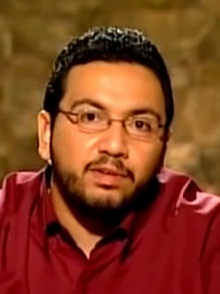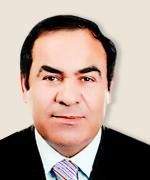One columnist recalls an incident in Egyptian history that resembles what happened and is still happening now. The other one is exploring the wheat issue and how Egypt can attain self-sufficiency.
In the presence of Al-Gabarty
Belal Fadl
Al-Shorouk Newspaper
“History teaches us that the poor have always been the strongest weapon, to which the ruler resorts when he wishes to fortify his throne’s support,” begins Belal Fadl. The columnist continues by saying that they are also a very dangerous weapon, one that usually ends a foolish ruler’s reign.
He recalls what Historian Abdel Rahman Al-Jabarti wrote regarding a violent revolution in 1695 Cairo carried out by the poor. According to Al-Jabarti, the poor from of all walks of life gathered before the Citadel, they yelled from hunger, but no one answered them. They then started a riot and stole from the merchants and divided the loot among themselves, which led to an increase in prices.
After 12 days, their revolution succeeded in deposing the magistrate, and on the 17th day, the new magistrate, Ismail Pasha, assigned the destitute to the rich and the princes so that the poor could be taken care of. He also assigned a fixed portion of food for the poor, until the prices decreased. The troubles did not end for Ismail Pasha; the city was also struck by a plague, prompting him to order the city morgue to handle the bodies without any payment.
When Ismail Pasha’s son was circumcised, he took care of the circumcision expenses of 2,336 poor boys, and he gave to each boy clothes and a dinar. “People thought that they have finally found their dream ruler, who was fair,” Fadl writes.
However, the magistrate’s economic policy suddenly changed, based on the advice of his financial advisor. The financial advisor, called Yasif, had a plan to increase money in the city’s treasury. On the announcement of these new laws, people were upset and complained to the city’s princes, who decided to protest the magistrate. The conflict exacerbated and the magistrate ended up selling out the financial advisor and imprisoning him.
Yet the magistrate’s late response resulted in the people’s demands increasing. Soldiers kidnapped the financial advisor from jail and executed him in public view. The execution only fuelled people’s anger; they burned the financial advisor’s corpse.
According to Al-Jabarti, soldiers then deposed the magistrate and after trying him, they found the leader owed the city money. Ismail Pasha sold his home and lived in exile in Baghdad.
“He ended his rule in only two years because he didn’t realise the most important lesson a ruler should learn: Never trust the anger of the poor, as it won’t be quelled permanently, unless you were permanently available for them.”
Fadl concludes: “Why does history repeat itself in developing countries? Simply because no one reads history or learns from its lessons.”
“History seems to find it easier to repeat itself rather than offering anything new,” Fadl writes.
‘Wheat’… You lying rag
Dr Mahmoud Emara
Al-Watan Newspaper
Columnist Dr Mahmoud Emara addresses the issue of Egypt’s wheat cultivation and self-sufficiency that were brought up by President Mohamed Morsi last week.
“I do not know how President Morsi dared to announce, live on TV and without batting an eye, that our wheat production for this year is nine and a half tonnes. And then some claimed that in two or three years, we would be exporting wheat!” he exclaimed.
Dr Emara says he would have done things differently than the minister of supply, who the columnist says is not doing a proper job. He first would have banned importing wheat starting in February, so farmers would have a place to store their high-quality wheat, which is now being stored in open storage spaces, susceptible to rodents and bacteria.
Secondly, he would have prepared for the harvest by supplying the appropriate rag bags instead of the flimsy ones. He states that Egypt loses between 15% and 20% of its wheat production annually during transport and storage.
Thirdly, he would have waited until the end or half way through the harvest to determine the average wheat production for each feddan (175 square metres) of land. He states that according to recent reports by the Ministry of Agriculture, Egypt cultivates on average three million feddans for wheat production each year, and that the average of each feddan is 15 ardeb (150 kilograms). This means that Egypt produces on average 6,750,000 ardebs annually. Then 15% of it is lost in transport and storage, bringing the total around 5,750,000 ardebs.
Out of the produced wheat, around 3.5 million ardebs are the government’s supply, and the rest goes to the farmers.
Egypt imported 11 million tonnes out of its 15 million tonne consumption from July 2012 until April 2013. According to customs, the harbours contain 9.5 million tonnes of wheat. In addition, the country can only store four million tonnes in the allotted 362 storage spaces.
“Therefore, if the production is increased by 30-50%, where will the surplus be stored?” Dr Emara asks.
The columnist says that Morsi should have reconsidered his statements instead of depending on empty words, which are said for the sake of propaganda.
Dr Emara does agree with Morsi that Egypt can become a wheat exporter, but a number of things must be done in order to achieve self-sufficiency.
First, the cultivation research department needs to be backed up financially. Second, 50,000 feddans needs to be planted with high-quality wheat kernels in November 2013 to be able to produce the seeds needed for the extra three million feddans.
Third, these seeds need to be planted in the 2014-2015 cultivation season, to be harvested in June 2015. This will lead to self-sufficiency in bread, but five million tonnes will still be needed for other products.
The extra wheat production means that 250 cement storage spaces need to be built, as well as the implementation of mechanised cultivation. In addition, half a million feddans need to be allocated for the cultivation of corn (5.5 million tonnes of corn are imported annually) to be mixed with the wheat for producing bread.
The last element is the founding of an industrial area in Owaynat for the production of meat and leather. The area will be operated using a million pieces of cattle from the Nile Basin countries. So, Egypt can export and consume meat for EGP 30 per wholesale kilogram. This means that Egypt will not need to cultivate a million feddans of alfalfa, which will save water (each feddan of alfalfa consumes around 10,000 cubic metres of water).
The project will also fortify Egypt’s relations with the Nile Basin countries, and will achieve self-sufficiency in the frozen meats sector. With the cooperation of the Italians, the project will also allow Egypt to export leather.
“In short, this country has all the capabilities, resources and expertise, but poverty, hunger and backwardness will remain synonyms to the capability of our rulers, who are poor of mind,” Dr Emara concludes.




